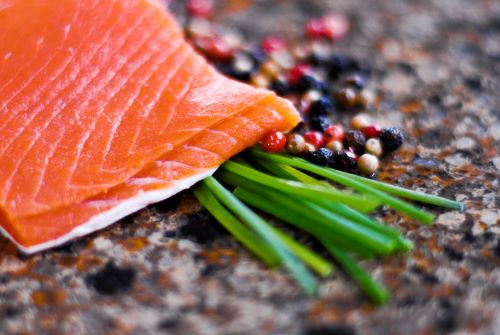
- ✓ Quite possibly the healthiest food on the planet!!
- ✓ Highest Omega 3's of any salmon, anywhere!
- ✓ Wild caught in Alaska's pure & pristine Bering Sea.
- ✓ Follows strict sustainability protocols.
- ✓ Flash-frozen & processed in AK (100% USA).
- ✓ Perfect for grilled, baked or smoked salmon.
- ✓ Caught by a WI commercial fisherman.
1, 6oz piece of boneless, skin-on King Salmon, sustainably-caught in Alaska's Dutch Harbor, flash frozen and vacuum-sealed.
King salmon is the largest of all the salmon AND the highest in Omega-3's of any salmon on the planet: a whopping 1700mg/3.5oz portion!
A mere 3oz serving will also give you 22g of complete protein!
Like the Sockeye, it also has vitamin D, B12, niacin, B6, riboflavin, selenium, potassium and phosphorus.
King salmon is also known as Chinook salmon.
Flavor. King has a rich, buttery flavor with its higher fat content delivering a luscious taste and texture. Flavor is more mild and slightly sweet with a more delicate and tender firmness. All of which makes it highly versatile in the kitchen.
Even though the King is a big fish, they are less abundant, resulting in a higher price tag compared to other fish.
Recipes!
It's so easy and so fast to cook, but did you know it gets even faster and easier if you use Captain Mark's directions of cooking from frozen?! Check 'em out:
Eat the skin!!
But only if it's wild fish. The skin of farmed or contaminated fish is basically a biohazard of mercury, PCBs and more. However, the wild ones store all the good stuff there!
"Just like the flesh, salmon skin is a good source of omega-3 fatty acids, vitamins B and D, and minerals like niacin and phosphorus. Not only is it a good source of omega-3s, but it’s actually where the highest concentration of these hard-to-get fatty acids are found!
Not only does leaving the skin on treat your mouth to a unique flavor and texture, but the additional omega-3s may minimize inflammation, support brain development, and reduce your triglyceride levels, therefore your risk of heart disease.
And the good news keeps getting better. By keeping the skin on during cooking, it also helps to retain salmon’s many nutrients and healthy oils. You’ll end up with a tastier meal with more nutrients because they won’t be lost during the preparation process." See more info here.
If you refuse to eat it, please, at least, feed it to your dog.
Sad facts:
- 90% of the seafood consumed in the US is imported (mostly from China and Russia). With most of the salmon coming from fish factories in Norway and Chile.
- Most grocery store salmon is processed overseas and re-imported through a long supply chain of middlemen.
- Typically 7-10 middlemen are used to get fish from water to shelf.
- Farmed salmon.
- Raised in a "fish factory" or CAFO (Confined Animal Feeding Operation) in cages full of parasites and diseases (b/c the fish are so unhappy they are trying to die).
- Eat GMO soy & corn, meat by-products like chicken feathers, canola meal and dye. Note the high soy composition in their feed means goodbye healthy omega-3s and hello inflammatory disease-causing omega-6s!
- doused regularly with pesticides and antibiotics (sea lice, eww) but still have a staggering death rate of 15-20%.
Seafood Watch, an independent guide to fish consumption affiliated with the Monterey Bay Aquarium, recommends avoiding most farmed Atlantic salmon because of excessive chemical use and disease. Read more HERE.








